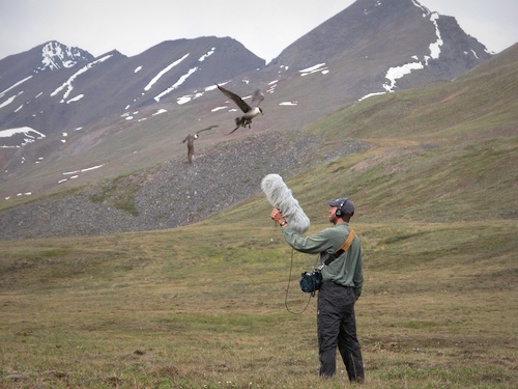The world’s largest natural sound archive is now fully digital and online, thanks to the Macaulay Library archive at Cornell University’s Lab of Ornithology. All archived analog recordings in the collection, dating back to 1929, have now been digitised and can be heard on the Macaulay Library website. It has taken archivists 12 years to complete the task – the collection contains nearly 150,000 digital audio recordings, with a total running time of 7,513 hours. About 9,000 species are represented. Although there’s an emphasis on birds, the collection also includes sounds of whales, elephants, frogs, primates, and more. This wonderful resource features some very unusual sounds – where else could you familiarise yourself with the call of the Cinnamon-chested Bee-eater?
On a less exotic (but by no means less interesting) note, the George Ewart Evans sound archive provides a document of sound a little closer to home. Widely regarded as the ‘grandfather’ of oral history, Evans’ archive compromises interviews and songs recorded between 1956 and 1977 which document rural British and Irish life. The collection consists of copy tapes dubbed from originals loaned to the National Sound Archive (at the British Library) in 1976.
There are 170 or so individual interviewees in the collection, nearly all born in the 1880s and 1890s. The oldest are Aldeman Ling, born in 1875, discussing bell-ringing; George Messenger, born in 1877, who talks about threshing and about working on the barges at Snape; and Susan Mullenger, born in 1878, recorded in 1967 talking about eating fried mice as a remedy for whooping cough! George’s youngest interviewees were members of the Blaxhall Band of Ringers (bell-ringers) including Sheila Shaw who at the age of sixteen had just finished her first peal involving over 5000 changes. And although Evans is very much associated with documenting disappearing Suffolk rural working life, he also tape-recorded people talking about a host of other topics including brewing in Burton-on-Trent, coalmining in Wales, Zeppelin attacks on Bungay during the First World War, an outbreak of bubonic plague in Ipswich around 1910, and working as a servant to actor Charles Laughton in London. Additionally, Evans’ subjects discuss folk beliefs about animals, medicine and witchcraft, folk and popular songs, entertainment and education in rural communities, domestic service and transport. A fascinating insight into rural British and Irish social history.
Follow the Macaulay Library and the British Library’s oral history account on Twitter.
